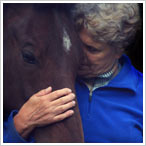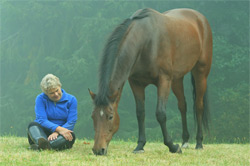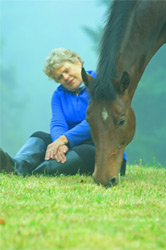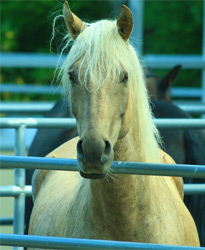Jeanne Sparks, Horsewoman
True Communication is Mental—Making a Different Type of Music with Horses
By Marjorie F. Eddington
Categories: Arts, Jesus' Commandment - To Love as He Loved, Solomon  Jeanne Sparks is not only an exceptional piano teacher, she is also a true horsewoman. She talks about the heart connection with a horse, how true communications happens mentally, how horses and people communicate through body language. She also explains how her love of music overlaps with her work with horses—both riding to music and working rhythmically on the ground in unison. Jeanne Sparks is not only an exceptional piano teacher, she is also a true horsewoman. She talks about the heart connection with a horse, how true communications happens mentally, how horses and people communicate through body language. She also explains how her love of music overlaps with her work with horses—both riding to music and working rhythmically on the ground in unison.
You're a musician and a horsewoman – a woman with widespread interests! We know how passionate you are about music. Tell us what you love about horses.
Horses are magnificent beings. They are very intelligent and receptive, and they mirror whatever we are feeling. They tell us stories, stories we may not even want to hear. If I go to them with joy, the look on their faces and the way their ears are pointed are different from a time when I go to them with a raunchy attitude. Horses respond to or react to our attitudes.
 There's a real heart connection with a horse, which shows that communication is really mental. How smoothly and at what speed he moves is determined by how I move my body along with how strong my mental intention is at that very moment. My horses and dogs know when I'm up in the morning. My horse, Winnie (short for Winnipesaukee), who is either by the driveway gate or down in his paddock, whinnies when I am up. Other times, I open the front door and he calls to me. It makes me smile. He is a fantastic horse. There's a real heart connection with a horse, which shows that communication is really mental. How smoothly and at what speed he moves is determined by how I move my body along with how strong my mental intention is at that very moment. My horses and dogs know when I'm up in the morning. My horse, Winnie (short for Winnipesaukee), who is either by the driveway gate or down in his paddock, whinnies when I am up. Other times, I open the front door and he calls to me. It makes me smile. He is a fantastic horse.
Because our mental communication is so clear, my horse does a variety of things for me without any tack (halter, bridle or harness): Winnie dances around the property, goes up and over a big rock pile, circles me, does figure eights around two trees, kicks a ball, goes sideways away from as well as toward me. I can even lead him from behind. I have had him since he was weaned at four months, so we have a particularly solid relationship.
That's awesome. What has helped you communicate so effectively?
 I have prayed a lot about God being the communicator and about seeing us all at-one with God. There has been huge progress in my relationships with both of my horses this year. Just asking, "What do I need to know?" is enough to open my thought to hearing the appropriate answer. I have prayed a lot about God being the communicator and about seeing us all at-one with God. There has been huge progress in my relationships with both of my horses this year. Just asking, "What do I need to know?" is enough to open my thought to hearing the appropriate answer.
Solomon, in his dream, asks God for an "understanding heart" to judge the people and to be able to discern between good and bad (I Kings 3:9). I regularly ask for the understanding heart to help me work with both my piano students and my horses in a loving way that will foster progress in communication. I ask for the clarity of thought to express my requests for improved musical sounds on the piano and for a deeper heart connection with the horses to help them express grace and beauty in their movements. I enjoy making a different kind of music with horses.
What do you mean by making music with horses?
To me, "making music" is the evidence of that special heart connection in the coordination and flow of body movements. And it is so much fun to see how quietly this heart connection can be expressed in calm, but brilliant moves on the horse's part. Rhythm is the foundation of music, and it is the foundation of movement—whether it is human or equine. There needs to be a steady beat and, at the same time, a sense of breathing and flow of the motion. The different gaits (walk, trot, and canter) of a horse are at different speeds (known as tempos in music).
What aspects of being a musician help you work with horses?
I have to feel changes within a musical composition, and when riding a horse, I have to think ahead as to where and when I wish to make a change. Winnie can go immediately from a walk to a trot just by catching my thought about it. Listening to what is being played musically is transferred to listening to the sound of the horse's hooves striking the ground. Sometimes in a show, there is a requirement to do 4 steps backward and then stop. So you have to count, listen, and feel.
I have shown a horse in competition, having his movements match specially recorded music. It is a recognized class even in the Olympics and is called a kür, or musical freestyle, which means riding required movements to music. It takes listening to the horse and often using a metronome to figure out the tempo of their footfalls to find music to match them. The walk is 4 beats; the trot is 2 beats; and the lope or canter is 3 beats. When there's an absolute match of horse to music, it is truly special. The horses love it. The whole show takes a lot of thought and time to put together.
What I'm doing now is working with the horse on the ground. It's called dancing with a horse, or liberty work, because halters and ropes are not used.
That sounds like it relies a lot on communication again.
 It does. Playing on the ground involves the human matching footfalls with the horse. Yes, I walk, jog, and "gallop" with him. My right foot moves when his right front moves. The more time we spend together, the more automatic it becomes to match footfalls, whereas, in the beginning, I really had to look, think, and adjust my movements. Our strides should be the same length, too. But I can't keep up with him at the canter. It does. Playing on the ground involves the human matching footfalls with the horse. Yes, I walk, jog, and "gallop" with him. My right foot moves when his right front moves. The more time we spend together, the more automatic it becomes to match footfalls, whereas, in the beginning, I really had to look, think, and adjust my movements. Our strides should be the same length, too. But I can't keep up with him at the canter.
It's my body language—a turning of the shoulder, a slight motion of the hand, the look in my eyes, as well as where my eyes are focused that give the direction. My breathing physically in rhythm with his breathing helps to keep us together. Breathing in and holding the breath means he stops.
A couple of months ago, I was playing with my other horse, Shilo, in the arena, but with tack on. It was one of those "a-ha" moments when I realized we were actually breathing together. It was a turning point in our relationship: his eyes softened, he licked his lips (a horse's signal that he understands), and he said, "Finally, you got it together. What a relief. I have been waiting for this to happen."
It's really neat that horses are so tuned into body language.
Getting a horse to do different things is all about body language, listening, and expanding your sense of awareness. The horse is listening and is completely aware. Just a twitch in your muscle is enough to tell a horse something different. With Winnie, I tell him just with my thought that I want to trot; then I follow it up with my body motion or the slightest change in my posture, and he'll trot. Sometimes, I've thought canter and he's gone to a canter even before I was expecting to canter.
A while ago on Biblewise, I shared a fantastic healing I had with a horse named Roxi who belonged to my neighbor. There was no connection between that human and the horse, so Roxi was brought to my barn for several weeks to experience a different human with a different perspective before she was sold. I was able to help her accept humans and to teach her how to move from my body language and intentions. Just like any other skill, it takes experiences like this to hone my own skills and continue to learn how to have that heart connection sooner. |